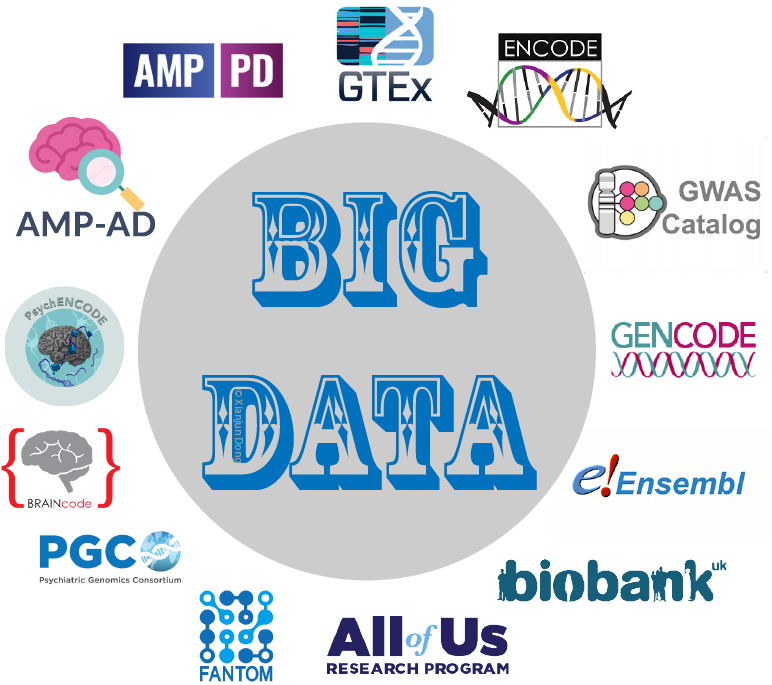
Analysis Service
At this stage, the program will primarily provide NGS data analysis service, including but not limited to:
- Data management (storage/backup, meta-table management, GEO/dbGap submission),
- RNA-seq analysis (from raw sequencing data to QC, to normalized gene expression table, group comparison, pathway analysis, and interactive reporting and visualization of the results),
- Small RNA-seq analysis (e.g. miRNAs, circRNAs, piRNAs, eRNAs, etc.),
- Single-cell omics analysis (10x Genomics pipeline, clustering, trajectory analysis, spatial transcriptomics, etc.),
- ChIP-seq analysis (e.g. QC, peak calling, differential binding, UCSC Genome Browser visualization, etc.)
- Variant calling from genotyping/WGS/WES data, and
- Other next-generation sequencing (NGS) data analysis (ATAC-seq, CAGE, ChIA-PET, Hi-C, etc.)

Data Service
Data is an asset. As a unique feature, we will also provide high-quality, curated, standardized data service to the faculty of the departments. Nowadays, more and more big biomedical datasets become publicly available, including UK Biobank, AMP-PD, AMP-AD, GTEx, PPMI, ROSMAP, CommonMind, ENCODE, PsychENCODE, etc. We will maintain the Data User Agreement application, renewal, and data access for the faculty members. We will also provide tutorial of what is included in the dataset, how to use the dataset etc. The users will only need to pay salary of the staff and the cost of data storage. We will also aim to improve the data sharing environment in the community by the FAIR principle.
Q&A
1. How does it work?
Like many other bioinformatics cores, we will set up a in-person or zoom meeting first to understand your project, your need, your timeline, your budget etc. From there we will let you know if we can take the job, and how many hours we estimate to finish the job, and how we will deliver the results. If we both agree to go ahead, we will sign a contract and follow what we agreed. Just keep in mind, we try to run this in a business model, but we are still doing research. Not every scientific question can be answered as expected. We might need more frequent discussion and may need to revise our contract.
2. What is the Cost?
We are currently supported by the NeuroTechnology Studio, but our goal is to become financially self-sustaining within two years, by charging for our services. We plan to do this in two ways:
-A regular hourly charge, which we will set initially at a flat rate of $150/hour for all BWH/MGH/DFCI labs. (There is a 40% extra for external collaboration). Following a free initial meeting, we will estimate the amount of work and the cost of the project. For larger projects (involving a month or more of work) we hope to offer a lower hourly rate.
-For longer-term collaborative projects, PI’s may wish to consider including a percentage of Dr Dong and/or hub staff members on their grants. We are happy to discuss this option in person.
3. Who can use our service?
During our launch phase we are supported by the Neurotechnology Studio, and our primary mission is to support brain research at BWH. We are also happy to work with researchers from other disciplines within our outside BWH, as our capacity permits.
4. Who should I contact?
Please send your service request to our team email (bioinformatics@bwh.harvard.edu). You can write to Dr Xianjun Dong, Director of the Genomics and Bioinformatics Hub (xdong@rics.bwh.harvard.edu) for any collaboration request.
Note that Dr Dong currently divides his time between running the Hub and conducting his own research, in collaboration with the Precision Neurology Program. He is available for Hub-related business on Mondays and Thursdays. At other times please expect some delay in responding to emails.
